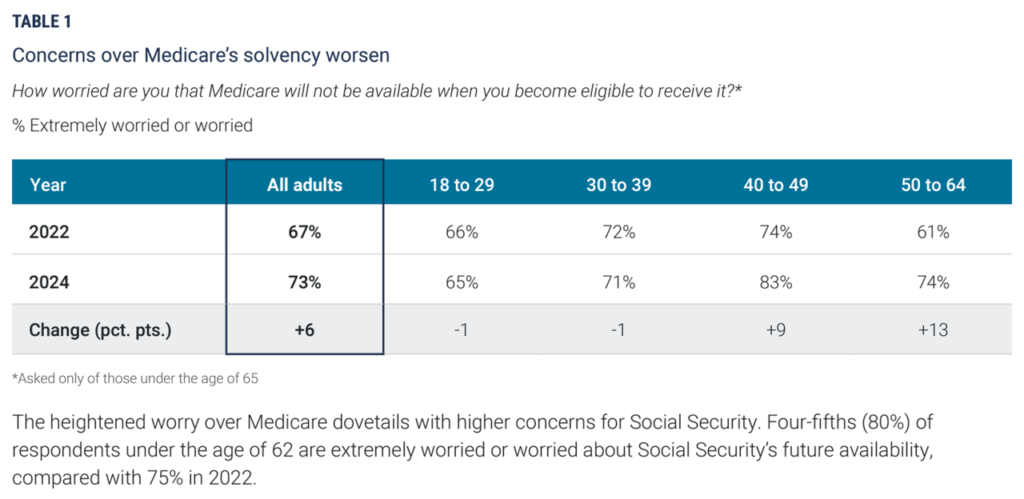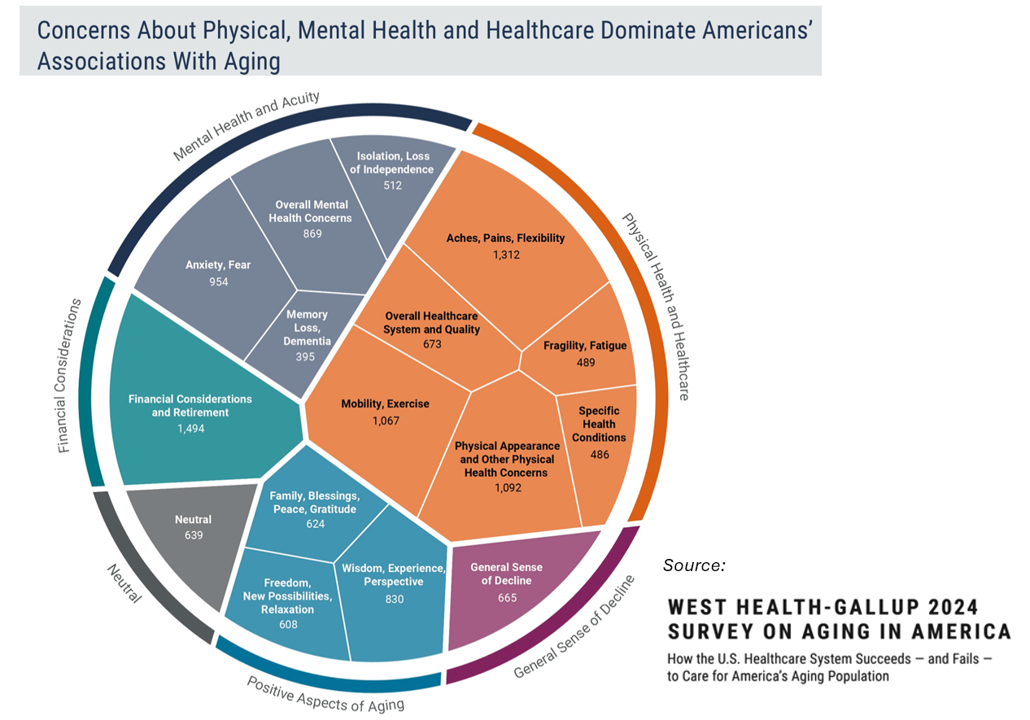You would assume that most people over 50 would be worried about the financial future of Medicare to cover health care as those middle-aged Americans age.
But a surprising two-thirds of young Americans between 18 and 29, and 7 in 10 between 30 and 39 years of age, are concerned that Medicare’s solvency will worsen leading to their not being able to receive Medicare when eligible to receive it, discovered in the 2024 Healthcare in America Report from West Health and Gallup. This year’s research focused on aging in America, exploring areas of U.S. health care system successes as well as downfalls for older American health citizens.

The annual study conducted a poll among 5,149 U.S. adults ages 18 and older as part of the Gallup Panel. Researchers then followed up with qualitative interviews in March among survey participants expressing interest in following up. 
There’s clearly anxiety and stress fomenting among Americans concerning the cost of health care and financial wellness overall — which underpins concerns about the future of Medicare and Social Security, the all-American safety net for older people in the nation.
This chart demonstrates stress levels for all adults and then the cohort of folks 65 years of age and older. See that the stats on pessimism running high for the prospects of wellbeing — financial, quality of life, and physical health — are greater when accounting for people under 65.

The pie chart shows us just how confident Americans are in paying for health care in the future — and the level of confidence is “not very,” especially among folks 40 to 64 years of age.
The most cost-secure are people over 65 (read: Medicare-secure, among two-thirds) and younger people 18 to 29 (6 of whom lack confidence to pay for health care as they age).
Still, one in three Medicare-aged Americans are not confident in their ability to pay for health care into aging.

Health Populi’s Hot Points: The “tortoise shell” segmented pie chart breaks out American adults’ concerns associated with aging, breaking down into:
- Physical health and healthcare
- General sense of decline
- Financial considerations, and
- Mental health and acuity.
There are also positive aspects identified (at the 6 o’clock section of the circle), such as wisdom, experience, and perspective; freedom, relaxation, and new possibilities (say, personal Renaissance!); and. family, blessings, peace and gratitude.

As I was finishing up this post, our postal mail arrived and I spotted a business envelope with “AARP” on the return address corner. So serendipity often surprising and delighting me, I opened the envelope to find a “Dear Jane” two-page letter with a warning that Congressional cuts to Medicare and Social Security could be in play sooner rather than later.
The letter reminds us, of course, that “AARP is standing up for you” (er, me as a dues-paying member of the organization). Following that reminder, AARP asks recipients of the letter to sign a petition to our respective members of Congress urging them to act “in the interests of Americans 50+.”
What’s useful to take away from the West Health + Gallup 2024 study on aging is that folks under 50 years of age (the entry-ramp to AARP membership, age-wise) are plenty concerned about the future of Medicare and Social Security.
We seem to have an intergenerational issue here that could be of interest not just to folks who are Medicare-eligible, but their adult children, their grandchildren, and other “younger” adults who are eligible to vote in November 2024.
The issue of Medicare-Security and Social Security crosses the chasm of age and stage of life, as health citizens’ financial wellness is integrated into their/our feelings of overall well-being and both physical-and-fiscal fitness. Hoping to hear more messaging in this election cycle that brings Americans together on this issue cross-generation.
And now if you want to continue reading, here’s a Postscript/PS from my week at #AHIP2024 last week, a highlight of which was my panel on the Health Consumer in 2030 — featuring a packed-room keen to hear the perspectives of a leader of an integrated health-system and plan (Don Antonucci, CEO of Providence Health Plan, a “Big Tech” leader and innovator (Dr. David Rhew, Chief Medical Office with Microsoft), and a physician-leader with one of America’s largest grocery chains coupled with a pharmacy, medical services, Medicare touchpoints, and other community-based health flows (Dr. Marc Watkins, Chief Medical Office of Kroger Health).
I developed four scenarios about that person-member-consumer in health care in 2030 and explained to the attendees just “why” I picked “2030” for the alternative futures. That’s because in 2030, all Baby Boomers will be 65 or older — so that Medicare and Social Security will have the total Boomer enrollees primed for monthly cash benefits and more intense medical services via Medicare (whatever form the plan[s] take six years from now}.
Between “now” and then, we’ll have undergone two Presidential elections and some State and local contests as well. What do we want our health/care world to look like? Issues like the composition of the Supreme Court, the actions of the FTC and FCC, environmental regulations (related especially to air, water, and climate), and other issues beyond “healthcare” per se will paint those future pictures. I’ll continue to be focused on refining these futures particularly after the November 2024 elections watching both Federal and State election outcomes…..
Yours in health, joy, and health citizenship….





 I love sharing perspectives on what's shaping the future of health care, and appreciate the opportunity to be collaborating once again with Duke Corporate Education and a global client on 6th May. We'll be addressing some key pillars to consider in scenario planning such as growing consumerism in health care, technology (from AI to telehealth), climate change, and trust -- the key enabler for health engagement or dis-engagement and mis-information. I'm grateful to be affiliated with the corporate education provider
I love sharing perspectives on what's shaping the future of health care, and appreciate the opportunity to be collaborating once again with Duke Corporate Education and a global client on 6th May. We'll be addressing some key pillars to consider in scenario planning such as growing consumerism in health care, technology (from AI to telehealth), climate change, and trust -- the key enabler for health engagement or dis-engagement and mis-information. I'm grateful to be affiliated with the corporate education provider  Thank you FeedSpot for
Thank you FeedSpot for